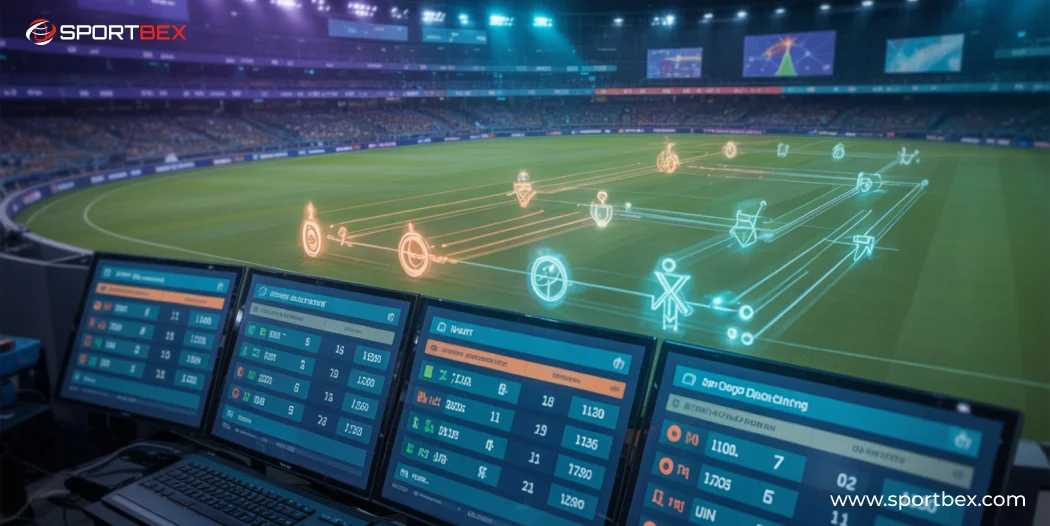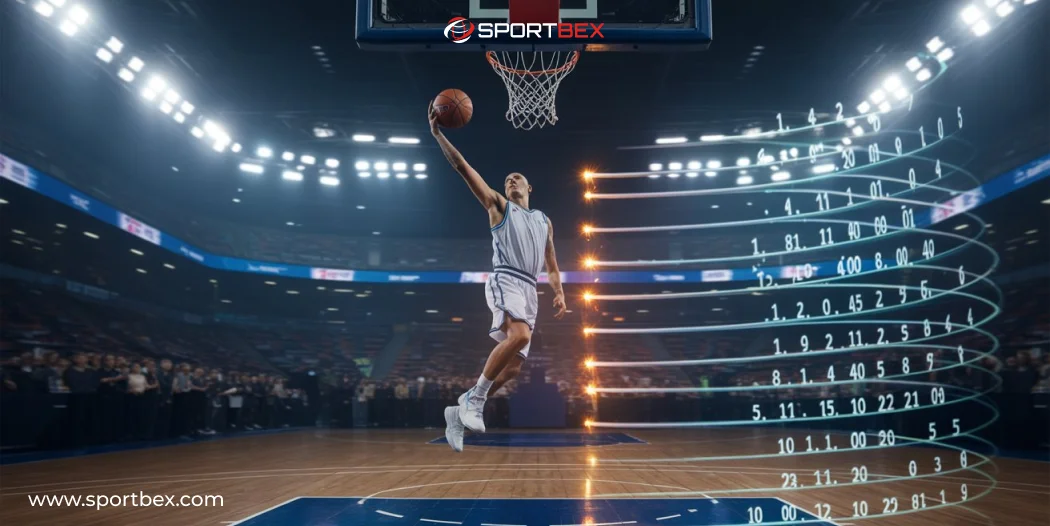In the fast-changing world of sports forecasting, Sports Prediction Markets are redefining how we understand and use betting data. These markets turn collective opinions into measurable odds, creating a bridge between data analysis and real-world predictions.
Unlike traditional betting, where outcomes rely mainly on bookmakers’ decisions, prediction markets use collective intelligence by drawing insights from bettors, traders, and data itself.
When paired with reliable sports betting data, prediction markets become powerful tools for accuracy and transparency. They combine human judgment with real-time data to forecast game results, player performances, and even season outcomes.
Understanding how sports prediction markets work is essential for anyone involved in sports betting predictions, from bettors and data analysts to developers integrating Sportsbook API. This also helps clarify the predict sports definition, especially for users trying to understand how predictions are formed using both data and market behavior.
This blog will explain what betting odds mean in prediction markets, how different platforms work, how odds and markets interact, and where the future of sports prediction is heading.
What Are Betting Odds in Sports Prediction Markets?
Betting odds are not just about potential winnings. They show how likely an outcome is to happen. In Sports Prediction Markets, odds reflect what participants collectively believe about an event.
For example, if a football team’s odds get shorter, it means more people expect that team to win. The odds move as market confidence changes, showing real-time predictions.
Unlike traditional betting, where bookmakers set fixed odds, prediction market odds adjust constantly based on trading activity. They work much like stock prices, updating as new information appears.
These odds rely on sports betting data such as player form, team stats, and recent results. With the help of predictive analytics in sports betting, traders can understand why odds shift and make smarter decisions.
In short, betting odds in prediction markets are living signals of collective opinion, powered by real-time data and constant market movement.
Types of Prediction Market Platforms
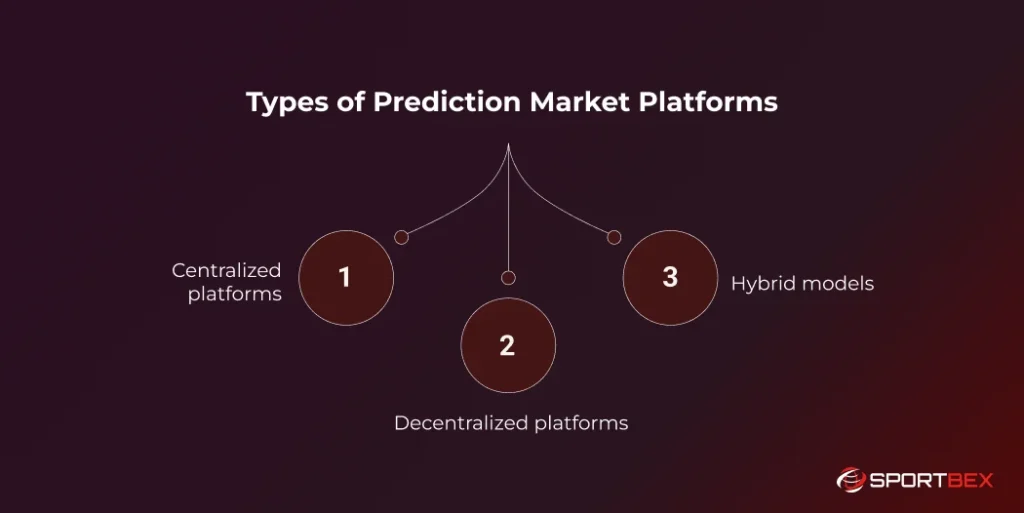
Prediction markets come in different forms based on how they operate and how participants interact with them. Each type offers unique advantages in terms of transparency, control, and speed. Understanding these platforms helps users choose the system that best fits their goals and level of trust.
Centralized Platforms
Centralized prediction markets are managed by a single company or exchange, much like a traditional sportsbook. These platforms set the rules, manage liquidity, and ensure market integrity. They are ideal for users who prefer regulated systems with clear oversight and dependable compliance.
Many major betting platforms and sportsbooks operate under this model, supported by Sportsbook API Integration. This integration connects them to trusted Odds API Providers for real-time updates. As a result, bettors can always access the most current odds, helping them make faster and more accurate sports betting predictions.
Decentralized Platforms
Decentralized platforms work on blockchain technology, where no single authority controls the market. Instead, smart contracts handle all transactions automatically, ensuring transparency and fairness.
These platforms allow anyone to buy or sell shares in event outcomes using cryptocurrencies or tokens. Because they operate without central control, decentralized prediction markets reduce the risk of manipulation and offer open access to users worldwide.
Hybrid Models
Hybrid models combine the best features of centralized and decentralized systems. They offer the trust and security of regulated markets while leveraging the innovation and transparency of blockchain technology.
This flexible approach allows developers and data providers to create efficient systems that meet diverse user needs. Many forward-looking sportsbooks and betting platforms are now adopting hybrid models to integrate real-time market insights and deliver a balanced experience between security and innovation.
How Betting Odds and Sports Prediction Markets Work Together
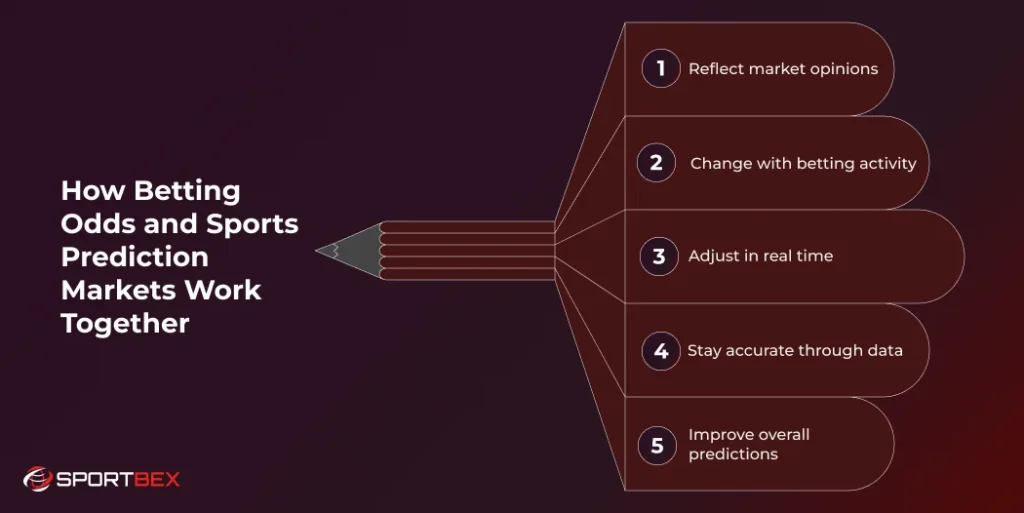
Sports prediction markets and live sports betting odds are closely connected. They work together to turn opinions and data into real-time insights. This relationship also supports prediction betting and helps make sports predictions more accurate, transparent, and easier to understand for bettors and analysts alike.
Reflect Market Opinions
Every trade or bet in a prediction market represents someone’s belief about what might happen. When thousands of people place their bets, their combined opinions create a collective forecast shown through the odds. These odds reflect what most participants think is likely to happen in a match or event.
Because money is involved, participants tend to make thoughtful and informed choices. This makes the odds a trustworthy reflection of real market sentiment rather than random guesses. The more people take part, the more accurate and balanced the prediction becomes.
Change with Betting Activity
Prediction markets are constantly moving as people place new bets. When more participants back a specific outcome, its odds get shorter, showing stronger confidence in that result. If interest drops, the odds lengthen to reflect that shift in sentiment.
This constant activity keeps the market dynamic and responsive. Bettors can often spot changes in public opinion or new information, like team news or player updates, simply by watching how the odds move over time.
Adjust in Real Time
One of the biggest advantages of prediction markets is their ability to react instantly. Odds update the moment new data becomes available, whether it’s breaking sports news, live game events, or performance updates. This ensures predictions stay accurate and reflect the most current situation.
Real-time updates also help bettors make quicker and smarter decisions. They can track changes as they happen, adapt their strategies, and respond to shifts before the market settles again.
Stay Accurate Through Data
Accurate data is what keeps prediction markets reliable. Platforms use Sportsbook API Integration, and Betting Odds API to pull live sports betting data from multiple sources. This ensures the odds displayed are based on real numbers, not outdated information or speculation.
Strong data connections mean the markets stay transparent and fair. Bettors can trust that the odds they see reflect real-world conditions, making their predictions more dependable and informed.
Improve Overall Predictions
When odds and prediction markets work together, they create a powerful feedback system. Data shapes the market, and traders react to that data, constantly refining the odds. This process improves accuracy and builds trust in every prediction made.
Over time, this cycle helps both professionals and casual bettors make better-informed decisions. By combining human insight with reliable sports betting data, prediction markets continue to make sports forecasting smarter and more precise.
The Future of Sports Prediction Markets
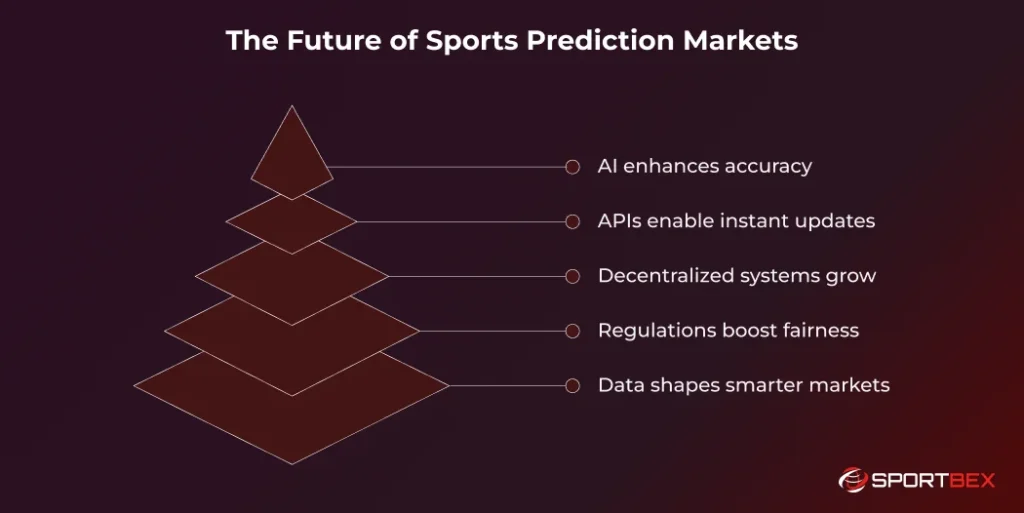
AI Enhances Accuracy
Artificial intelligence is quickly becoming a key part of predictive analytics in sports betting. AI can analyze millions of data points, from player performance and weather conditions to team form and fan sentiment, all within seconds. This helps prediction markets fine-tune their odds and improve the precision of forecasts.
For bettors and platforms, AI means better decision-making. It reduces bias, spots hidden patterns in sports betting data, and delivers more consistent results. As AI models continue to learn and adapt, their role in shaping accurate sports betting predictions will only grow stronger.
APIs Enable Instant Updates
APIs are transforming how sports prediction markets function. By connecting platforms with multiple Odds API Providers and a reliable live odds API, APIs allow for real-time updates across every market and event. This ensures that sportsbooks set odds based on the latest data without delays or errors.
With Sportsbook API Integration, markets become faster, smoother, and more responsive. Bettors benefit from instant information, while operators gain access to a continuous flow of accurate data, helping everyone make smarter, faster, and more informed choices.
Decentralized Systems Grow
Blockchain technology is helping prediction markets become more open and transparent. In decentralized systems, there is no single authority controlling the market. Instead, smart contracts manage everything automatically and securely. This ensures fairness and builds trust among global participants.
As more users look for platforms that offer privacy, security, and independence, decentralized prediction markets will continue to expand. They give users more control over their funds and data, making sports prediction markets more accessible worldwide.
Regulations Boost Fairness
Regulation is another key factor shaping the future of prediction markets. As these platforms grow, governments and organizations are introducing clearer rules to ensure fairness, integrity, and responsible participation. These efforts protect bettors and maintain transparency across the industry.
Stronger regulations also encourage trust. When users know that prediction markets follow clear standards, they’re more likely to participate. This sense of safety and fairness helps the entire ecosystem grow sustainably.
Data Shapes Smarter Markets
Data will always remain at the heart of sports prediction markets. The ability to collect, process, and analyze sports betting data from multiple sources is what keeps these systems accurate and insightful. In the future, this data will not only power odds but also guide trading, analytics, and entertainment experiences.
As technology improves, data-driven prediction markets will evolve into intelligent ecosystems. They will deliver deeper insights, better transparency, and more accurate sports betting predictions, reshaping how the world forecasts and engages with sports.
Get a Ready-Made Platform On Rent.
Get Started TodayConclusion
The connection between betting odds and Sports Prediction Markets marks the next step in smart sports forecasting. By combining collective human insight with reliable sports betting data, these markets bring greater transparency, fairness, and accuracy than traditional betting methods.
For bettors, analysts, and developers using Sportsbook API Integration, understanding how these markets function is essential. They don’t just improve sports betting predictions; they redefine how information moves through the industry.
Prediction markets will become more precise, data-driven, and accessible. Sports prediction is no longer just about luck; it’s a science shaped by data, powered by people, and refined by market intelligence.
Frequently Asked Questions
Sports Prediction Markets are platforms where participants can trade shares or place bets on the outcomes of sporting events. The odds reflect the collective opinion of all participants, providing real-time predictions.
In Sports Prediction Markets, participants buy or sell shares based on their expectations of an event. Odds adjust dynamically based on market activity and data, reflecting the probability of outcomes in real time.
They combine collective human insights with real-time sports betting data. The constant feedback loop between market activity and updated odds helps produce predictions that are often more accurate than traditional betting methods.
There are three main types: centralized platforms managed by a single authority, decentralized platforms built on blockchain, and hybrid models that combine features of both to ensure transparency and security.
Yes. By analyzing odds trends and market activity, bettors can make informed decisions. The combination of predictive analytics and real-time data allows users to refine their sports betting predictions.
Recent Blog
How NBA Odds APIs Deliver Real-Time Betting Data for Sportsbooks
February 26, 2026
Tracking Tennis Odds Live Using Real-Time Betting APIs
February 26, 2026
